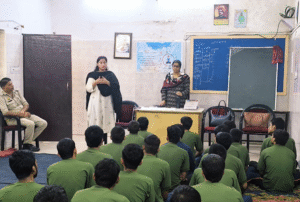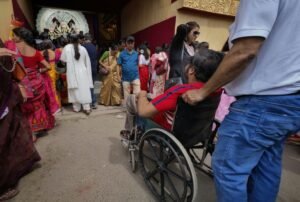
The sweltering heat of Delhi’s summers was nearing its end that September afternoon as I waited for my friend at a local market complex. I was sitting in a tea shop which was adjacent to a busy road. It was a typical evening– some people were talking, others sat around a boy who was playing a guitar. I basked in the aroma of brewing coffee punctuated by puffs of cigarette smoke.
As soon as my friend walked in, I felt something was amiss. He didn’t greet me with his usual cheeriness. I asked him if he was feeling alright. “Of course I am not alright. I saw a man lying in a pool of blood, with his throat slit ,” he replied.
There had been a gruesome murder in our locality, he told me. A man in his late 20s had been found dead in his apartment, brutally murdered and with multiple stab wounds. There were no clothes on his body when he was found. This information really shocked everyone.
At the teashop, a pall of gloom replaced the cheer. The guitar guy stopped playing and everyone was clicking their tongues and condemning the act. “He was a good person. How could someone kill him?” one of the older gentlemen exclaimed.
“It is demonic,” the teashop owner said. We could talk of nothing else, and think of little else. It was especially hard for my friend, who was among the people who had found the body and alerted the police.
I too was stunned by the brutality of the murder. As a social worker, I am trained not to make judgements about people, no matter how difficult a situation may seem. Yet, it can seem impossible to be objective in such ethical conflicts. I remembered my professor’s warning, “It is only human to assume the worst.”
Days passed. Conversations around this incident faded, the autumn heat mellowed down further, and there was a nip in the air. On a rainy morning, I was on my way to meet a child’s family. As I watched the rainwater collect on the autorickshaw’s windshield, I started craving jalebis. I promised myself a treat of jalebis after finishing work.
I soon met the child’s family who were waiting for me. We exchanged pleasantries and I spoke to the child. He was happy about his exams ending and that he had more time to play.
Then, I saw my colleague approaching me. He looked serious. “We have been assigned a case of a child who is a sexual abuse survivor and has committed murder,” he said. As I scanned the case documents that he handed me, I realized it was the case from my locality.
The young man had been killed by the minor whom he had allegedly been sexually abusing for nearly a year. A hundred questions filled my mind. Did he actually commit the murder? Was he lying about the sexual abuse? I was in turmoil. Would I be able to remain objective in providing psycho-social support to this child – a child who is a victim of sexual abuse – who may have murdered his perpetrator?
I was also concerned about how people in my locality would react if they knew that I was supposed to care for the child who they thought was a “demon”. All the voices and words that I heard in the teashop that September afternoon replayed in my head.
Between the whirlpool of these questions, I remembered my professor’s words during a lecture on “The Principle of Controlled Emotional Involvement”. On a lazy winter morning, in an almost empty building, my professor, struggling to keep the attention of her sleepy students, had said, “Why do we need to have a controlled emotional involvement? Because our emotions and prejudices prevent us from seeing the entire picture and render us an ineffective helper.” At the time, I had not understood what she meant. All those years later, with the documents of this case in front of me, I finally understood.
I also realized that I have lost my appetite for jalebis since that morning.
I decided to meet the child, to ease the conflicts within me and to give a face to the faceless legal documents that represented him.
I called up the child’s mother. A soft male voice answered. “Are you a member of the child’s family?” I asked. “I am the child” said the voice from the other side. In that moment, all the ideas and images I had built up fell away. Whatever the facts of the case may be, I remembered that I was dealing not with a “demon”, but a person. I set up a meeting with him, and as I write this I am preparing to visit his home. I know now that my emotions might interfere with my perceptions, and I need to be aware of this. There it is– the principle of controlled emotional involvement, developing right in front of my eyes.
The incident taught me something I will hold close for the rest of my life. I have come to realize that I have grown as a person, since the time when I was struggling to keep myself awake during my college lectures, to this day when I see those scribbled notes come to life around me.












